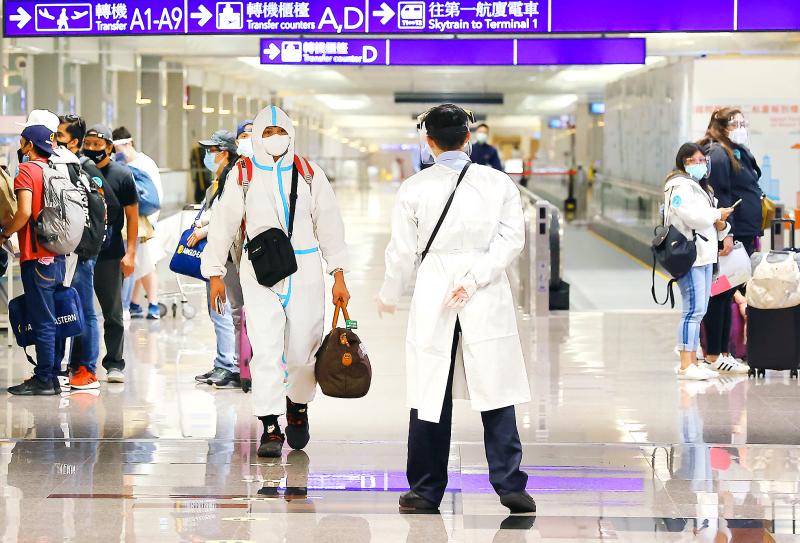Taiwan is aiming to ease its strict COVID-19 quarantine policy from next month as it needs to gradually resume normal life and reopen to the world, the government said yesterday.
Since the COVID-19 pandemic began two years ago, Taiwan has succeeded in keeping reported cases below 20,000, having enforced a blanket two-week quarantine for everyone arriving in the nation, even as large parts of the rest of the world have reopened.
Speaking at a meeting with senior health officials, Premier Su Tseng-chang (蘇貞昌) said that even though there could be further domestic infections, the government was “quite confident” in its disease prevention measures.

Photo: Chu Pei-hsiung, Taipei Times
“The government must also take into account livelihoods and economic development, gradually return to normal life and step out to the world,” the Executive Yuan cited Su as saying.
On the precondition that there are sufficient medical supplies and preparations, and that the vaccination rate continues to rise, Su said that he had asked the Central Epidemic Command Center to “consider whether reasonable and appropriate adjustments” should be made to the quarantine and entry policy for businesspeople.
Minister of Health and Welfare Chen Shih-chung (陳時中), who heads the center, said that it would aim to cut the quarantine period from 14 days to 10 days before the middle of next month, confident that it could detect any infections within that period with testing.
“Basically, we can relax epidemic prevention” measures, Chen said.
Asked whether quarantine could be done away with completely before the summer holidays, Chen said: “The possibility is not high.”
About 30 percent of the nation’s 23.5 million people have now had a booster dose of COVID-19 vaccine, a figure that is gradually rising, and the government has said that it wants to get that to 50 percent before easing entry requirements.
Taiwan has never gone into full lockdown during the pandemic and has never closed its borders, although arrivals have generally been limited to Taiwanese and foreign resident certificate holders.
Chen said business travelers would be able to return and would have to do the same 10-day quarantine, but he could not offer a time frame on allowing tourists back in.
The center is dealing with a handful of new domestic COVID-19 cases per day, all as a result of the more infectious Omicron variant of SARS-CoV-2.
Officials have said they are confident they can contain those outbreaks.

The US government has signed defense cooperation agreements with Japan and the Philippines to boost the deterrence capabilities of countries in the first island chain, a report by the National Security Bureau (NSB) showed. The main countries on the first island chain include the two nations and Taiwan. The bureau is to present the report at a meeting of the legislature’s Foreign Affairs and National Defense Committee tomorrow. The US military has deployed Typhon missile systems to Japan’s Yamaguchi Prefecture and Zambales province in the Philippines during their joint military exercises. It has also installed NMESIS anti-ship systems in Japan’s Okinawa

‘WIN-WIN’: The Philippines, and central and eastern European countries are important potential drone cooperation partners, Minister of Foreign Affairs Lin Chia-lung said Minister of Foreign Affairs Lin Chia-lung (林佳龍) in an interview published yesterday confirmed that there are joint ventures between Taiwan and Poland in the drone industry. Lin made the remark in an exclusive interview with the Chinese-language Liberty Times (the Taipei Times’ sister paper). The government-backed Taiwan Excellence Drone International Business Opportunities Alliance and the Polish Chamber of Unmanned Systems on Wednesday last week signed a memorandum of understanding in Poland to develop a “non-China” supply chain for drones and work together on key technologies. Asked if Taiwan prioritized Poland among central and eastern European countries in drone collaboration, Lin

BACK TO WORK? Prosecutors said they are considering filing an appeal, while the Hsinchu City Government said it has applied for Ann Kao’s reinstatement as mayor The High Court yesterday found suspended Hsinchu mayor Ann Kao (高虹安) not guilty of embezzling assistant fees, reducing her sentence to six months in prison commutable to a fine from seven years and four months. The verdict acquitted Kao of the corruption charge, but found her guilty of causing a public official to commit document forgery. The High Prosecutors’ Office said it is reviewing the ruling and considering whether to file an appeal. The Taipei District Court in July last year sentenced Kao to seven years and four months in prison, along with a four-year deprivation of civil rights, for contravening the Anti-Corruption

NO CONFIDENCE MOTION? The premier said that being toppled by the legislature for defending the Constitution would be a democratic badge of honor for him Premier Cho Jung-tai (卓榮泰) yesterday announced that the Cabinet would not countersign the amendments to the local revenue-sharing law passed by the Legislative Yuan last month. Cho said the decision not to countersign the amendments to the Act Governing the Allocation of Government Revenues and Expenditures (財政收支劃分法) was made in accordance with the Constitution. “The decision aims to safeguard our Constitution,” he said. The Constitution stipulates the president shall, in accordance with law, promulgate laws and issue mandates with the countersignature of the head of the Executive Yuan, or with the countersignatures of both the head of the Executive Yuan and ministers or